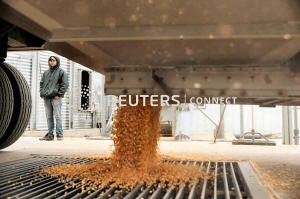|
As loans and aid dry up, U.S. farmers
face fresh challenge from shutdown
 Send a link to a friend
Send a link to a friend
 [January 04, 2019]
By P.J. Huffstutter [January 04, 2019]
By P.J. Huffstutter
CHICAGO (Reuters) - U.S. farmers, already
battered by the U.S.-China trade war, are facing increasing anxiety as
the partial government shutdown nears the two-week mark, leaving crucial
aid and loan payments in limbo.
The shutdown has blocked assistance for many farmers, who at this time
of year apply for federal loans as they pay bills due from the previous
year and begin budgeting for next season's planting. It is also
affecting aid payments promised to allay the effects of the trade war.
The timing is particularly bad for U.S. farmers, who are already
suffering the fallout from the trade war's raised tariffs and low prices
for a top export crop, soybeans, with purchases by China lagging
previous years.
"It's just bad news on top of everything right now," said Brian Duncan,
whose family farms corn and soybeans and raises hogs in northwestern
Illinois.
The partial shutdown was triggered last month by President Donald
Trump's demand for $5 billion to fund a U.S.-Mexico border wall.
Democrats now controlling the House of Representatives have vowed to
fund the government through legislation, but Trump has insisted that any
measure to fully reopen the government include wall money.

Pressure on Trump and lawmakers to end the partial shutdown is growing
from the agricultural sector. Many of the nation's 3.2 million farmers
and ranchers are Republicans, and have been steadfastly loyal to the
president. But some farmers have warned their support for a Trump
campaign in 2020 is not guaranteed if the farm economy worsens and trade
disputes continue to threaten demand for U.S. crops.
About a quarter of the federal government, or 800,000 workers -
including some from the U.S. Department of Agriculture - are off the
job.
The USDA's Farm Service Agency (FSA) managers and supervisors were
instructed to cancel all previously arranged loan closings when the
shutdown started, according to the agency's shutdown plan posted online.
Agency officials could not be reached for comment Thursday.
Commodity traders and farmers alike are also growing nervous that the
USDA will also push back or possibly cancel a slew of global supply and
demand grain reports set for release on Jan. 11. The data is watched by
farmers when making their planting plans.
[to top of second column]
|

A farmer watches as corn kernels are dumped into a grain elevator
during a harvest on a farm near Dixon, Nebraska, U.S., October 26,
2017. REUTERS/Lucas Jackson/File Photo

LEVELS OF UNCERTAINTY
U.S. grain farmers have been increasingly turning to the FSA for
loan assistance as they struggle with low commodity prices and trade
issues in recent years. Banks, too, have relied on the agency to
help guarantee the loans they are issuing to farmers – particularly
for shorter-term farm operational loans.
"This is the time of year when farmers are talking to their bankers
to get operational loans, and the money from the federal government
is not coming in," said Ted Seifried, vice president of the Zaner Ag
Hedge Group in Chicago, who works with farmers.
The government last year also pledged up to $12 billion in aid, much
of it in direct payments to soy, pork and dairy farmers, to help
offset some of the losses for crops hit by retaliatory Chinese
tariffs imposed in response to Washington's tariffs on Chinese
goods.
The deadline to apply for the aid is Jan. 15, yet the FSA offices
where farmers must submit their applications have been shuttered
since Dec. 28.
Some farmers had been hoping to plant more corn, in the hopes that
China will increase its corn imports for ethanol production. But
planting corn can be more expensive than soybeans - a cost many
operators cover through loans or aid payments.
For Duncan, a wet and snowy harvest season meant he was not able to
finish harvesting last year's corn until Dec. 31 - making it too
late for him to apply for the corn trade aid for now.
"Between the tariffs and the government shutdown, it's adding levels
of uncertainty to farming that no one wants," said Duncan, 54.

(Reporting by P.J. Huffstutter, writing by Caroline Stauffer,
additional reporting by Julie Ingwersen in Chicago and Ayenat Mersie
in New York, editing by Rosalba O'Brien)
[© 2019 Thomson Reuters. All rights
reserved.]
Copyright 2019 Reuters. All rights reserved. This material may not be published,
broadcast, rewritten or redistributed.
Thompson Reuters is solely responsible for this content. |